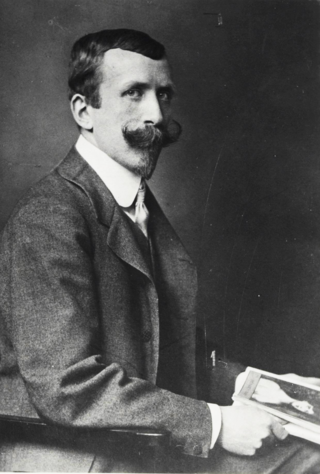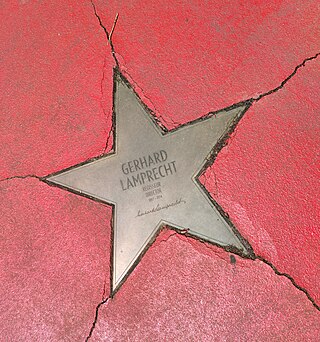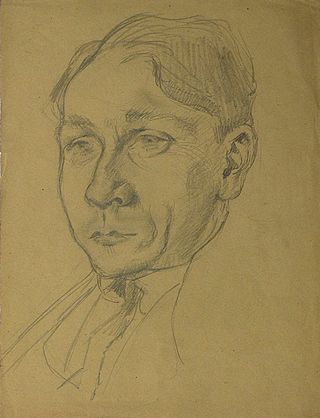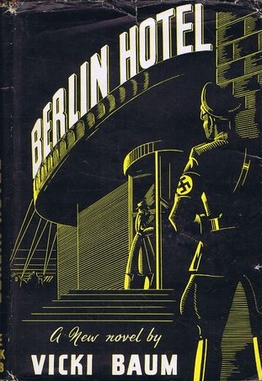Related Research Articles

Grand Hotel is a 1932 American pre-Code drama film directed by Edmund Goulding and produced by Metro-Goldwyn-Mayer. The screenplay by William A. Drake is based on the 1930 play by Drake, who had adapted it from the 1929 novel Menschen im Hotel by Vicki Baum. To date, it is the only film to have won the Academy Award for Best Picture without being nominated in any other category.

Ewald André Dupont was a German film director, one of the pioneers of the German film industry. He was often credited as E. A. Dupont.

Luiz Heinrich Mann, best known as simply Heinrich Mann, was a German writer known for his socio-political novels. From 1930 until 1933, he was president of the fine poetry division of the Prussian Academy of Arts. His fierce criticism of the growing Fascism and Nazism forced him to flee Germany after the Nazis came to power during 1933. He was the elder brother of writer Thomas Mann.

Emil Erich Kästner was a German writer, poet, screenwriter and satirist, known primarily for his humorous, socially astute poems and for children's books including Emil and the Detectives and Lisa and Lottie. He received the international Hans Christian Andersen Award in 1960 for his autobiography Als ich ein kleiner Junge war. He was nominated for the Nobel Prize in Literature in six separate years.

Paul William Gallico was an American novelist and short story and sports writer. Many of his works were adapted for motion pictures. He is perhaps best remembered for The Snow Goose, his most critically successful book, for the novel The Poseidon Adventure, primarily through the 1972 film adaptation, and for four novels about the beloved character of Mrs. Harris.
Grand Hotel is a musical in two acts with a book by Luther Davis, music and lyrics by Robert Wright and George Forrest, and additional music and lyrics by Maury Yeston.

Hedwig "Vicki" Baum was an Austrian writer. She is known for the novel Menschen im Hotel, one of her first international successes. It was made into a 1932 film and a 1989 Broadway musical.
Curt Siodmak was a German-American novelist, screenwriter and director. He is known for his work in the horror and science fiction film genres, with such films as The Wolf Man and Donovan's Brain. He was the younger brother of noir director Robert Siodmak.

The Hotel Adlon Kempinski Berlin is a luxury hotel in Berlin, Germany. It is on Unter den Linden, the main boulevard in the central Mitte district, at the corner with Pariser Platz, directly opposite the Brandenburg Gate.

Hotel Berlin is an American drama film made by Warner Bros. in late 1944 to early 1945 starring Faye Emerson, Helmut Dantine, Raymond Massey and Andrea King. Directed by Peter Godfrey, it is set in Berlin near the close of World War II, and is based on the novel Hotel Berlin by Vicki Baum.

Hotel Excelsior was a hotel in Berlin, Germany. It occupied number 112/113, Königgrätzer Straße on Askanischer Platz in the Berlin district of Kreuzberg. It was one of the largest and most luxurious hotels in Europe, until its destruction during World War II.

Heinrich Piel, known professionally as Harry Piel, was a prolific German actor, film director, screenwriter, and film producer who was involved in over 150 films.

Edward Knoblock was a playwright and novelist, originally American and later a naturalised British citizen. He wrote numerous plays, often at the rate of two or three a year, of which the most successful were Kismet (1911) and Milestones. Many of his plays were collaborations, with, among others, Vicki Baum, Beverley Nichols, J. B. Priestley and Vita Sackville-West.

Imperial Palace is the last and longest novel by author Arnold Bennett.

Gerhard Lamprecht was a German film director, screenwriter and film historian. He directed 63 films between 1920 and 1958. He also wrote for 26 films between 1918 and 1958.
Menschen im Hotel is a 1959 German and French black-and-white drama film directed by Gottfried Reinhardt, and produced by Artur Brauner. It starred O.W. Fischer, Michèle Morgan, Heinz Rühmann and Gert Fröbe. The screenplay was written by Ladislas Fodor and Hans Jacoby, based on the 1929 novel by Vicki Baum. The film is a remake of the 1932 classic Grand Hotel.

Paul Kemp was a German stage and film actor. Kemp worked as a piano accompaniest for silent films, and then served as an ambulance driver on the Western Front during the First World War. Post-war he moved into acting on the stage in Düsseldorf and Hamburg. His career really took off when he moved to Berlin in 1929, appearing in the hit stage version of the novel Menschen im Hotel by Vicki Baum. He made his film debut in 1930, shortly after the introduction of sound film. He appeared prolifically in German and Austrian films until his death in 1953.
Heinrich Gotho was an Austrian film actor. Born in Dolina, he started his acting career at some provincial theatres until he found an engagement at the Neues Volkstheater in Berlin. The character actor appeared in over 50 films between 1922 and 1933, mostly in smaller roles. He notably appeared in numerous films by director Fritz Lang, among them Dr. Mabuse the Gambler (1922), Metropolis (1927) and M (1931). Gotho was forced to retire from film acting in 1933; as a Jew he could no longer work in Nazi Germany. He died in 1938 in the Jewish Hospital of Berlin-Wedding.

Grand Hotel is a 1931 play by the British-American writer Edward Knoblock. A drama, it is based on the 1929 German novel Grand Hotel by Vicki Baum about guests staying at a Grand Hotel in Berlin.

Hotel Berlin is 1943 novel by the Austrian-born writer Vicki Baum. She had fled into exile following the Nazi takeover. The novel is set in a luxury hotel in Berlin during the later stages of the Second World War. It echoes the theme of Baum's best-known novel Grand Hotel which was first published in 1929 on the brink of the Great Depression. Some editions are entitled Hotel Berlín 1943 and others Berlin Hotel.
References
- ↑ Bettina Matthias (1 January 2006). The Hotel as Setting in Early Twentieth-century German and Austrian Literature: Checking in to Tell a Story. Harvard University Press. p. 192. ISBN 978-1-57113-321-2.